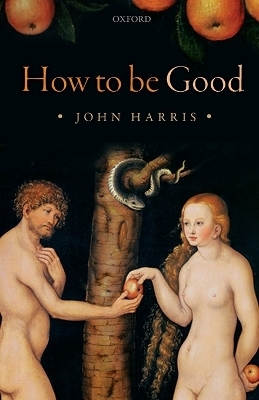
How to be Good
Oxford University Press (Verlag)
978-0-19-882240-0 (ISBN)
'How to be Good?' is the pre-eminent question for ethics, although one that philosophers and ethicists seldom address head on. Knowing how to be good, or perhaps (more modestly and more accurately) knowing how to go about trying to be good, and the ways in which it is pointless or self-defeating to try to be good, is of immense theoretical and practical importance. And what goes for trying to be good oneself, goes also for trying to provide others with ways of being good, and for trying to make them good whether they like it or not. This is what is meant by 'moral enhancement'.
There are many proposed methodologies or technologies for moral enhancement. Some of them are ancient and/or familiar: we may attempt moral enhancement by setting a good example, by good parenting, by education or training, by peer pressure, by telling stories with a moral, in words or in pictures, and so on. We can imbibe substances with mood changing or motivational effects. We can also use medical, biological, or other scientific means; we can search for and deploy chemicals, or biological or molecular agents, which we believe will change people for the better; and we can modify the environment to make bad outcomes of all sorts less likely. We can experiment with political and social systems, institutions, and arrangements designed to make the world a better place or people better people. The question whether and to what extent moral enhancement is possible is the subject of this book.
John Harris is Emeritus Professor of Bioethics at the University of Manchester. His books include: The Value of Life (Routledge, 1985), Wonderwoman and Superman (OUP, 1992), Clones Genes and Immortality (OUP, 1998). He is the author or editor of twenty books and over three hundred and fifty papers.
1: Introduction2: What it's Like to be Good: Individual Responsibility3: Taking the Human out of Human Rights4: Moral Enhancement and Freedom5: Taking Liberties with Free Fall6: The God Machine, the God Delusion, and the Death of Liberty7: 'Ethics is for Bad Guys': Putting the 'Moral' into Moral Enhancement8: Molecules and Morality9: Moral Progress and Moral Enhancement10: Mind Reading and Mind Misreading11: The Safety of the People12: Persons or MachinesAcknowledgementsIndex
| Erscheinungsdatum | 30.07.2018 |
|---|---|
| Verlagsort | Oxford |
| Sprache | englisch |
| Maße | 143 x 217 mm |
| Gewicht | 276 g |
| Themenwelt | Geisteswissenschaften ► Philosophie ► Ethik |
| Medizin / Pharmazie ► Medizinische Fachgebiete ► Medizinethik | |
| Studium ► Querschnittsbereiche ► Geschichte / Ethik der Medizin | |
| ISBN-10 | 0-19-882240-5 / 0198822405 |
| ISBN-13 | 978-0-19-882240-0 / 9780198822400 |
| Zustand | Neuware |
| Informationen gemäß Produktsicherheitsverordnung (GPSR) | |
| Haben Sie eine Frage zum Produkt? |
aus dem Bereich


